Ukraine’s progress undermines Putin’s image as ‘Mr Security’
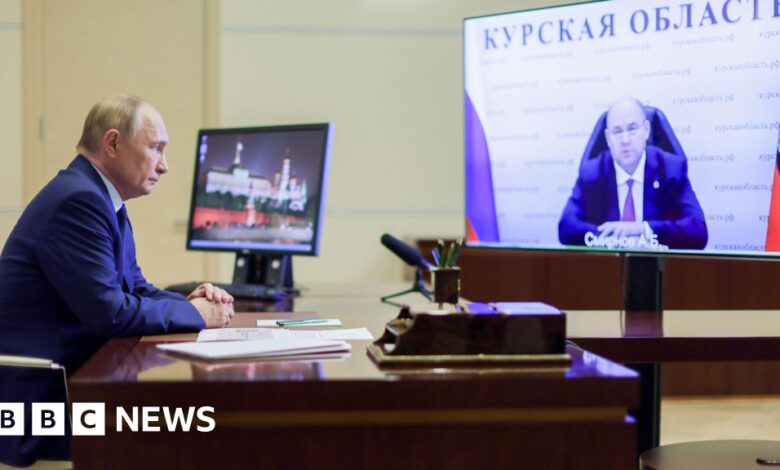
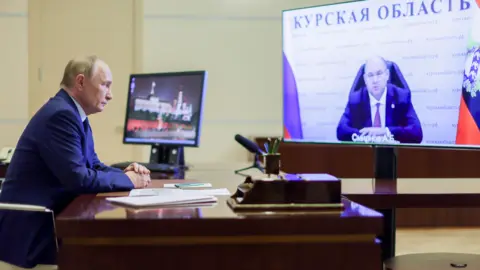 United States Environmental Protection Agency
United States Environmental Protection AgencyKursk ship.
These were some of the first words I wrote and spoke as a BBC reporter.
In 2000, I reported on the sinking of the Kursk submarine in the icy waters of the Barents Sea. One hundred and eighteen submariners were killed.
Vladimir Putin has been president for less than half a year. I still remember Russian TV channels criticizing him for his handling of the disaster.
This week marks 24 years since the sinking of the K-141 Kursk submarine. And once again, the word Kursk fills my news feed from Russia. This time it is the Kursk Region, where the Ukrainian army launched a surprise attack and where they have held territory for nine days now.
Same word.
But Russia in 2024 is very different from Russia in 2000.
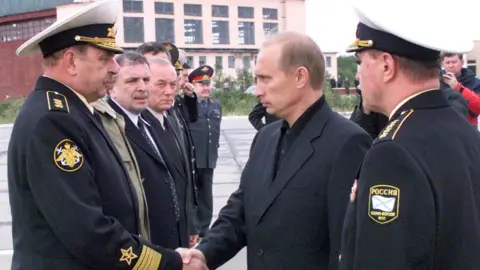 Getty Images
Getty ImagesThis time on Russian television there was no sign of criticism of President Putin; no questioning of his decision; no suggestion that his invasion of Ukraine had led to this dramatic moment. On the other hand, the Kremlin has had a quarter-century to establish tight control over Russian media and its messaging.
But will these events hurt Vladimir Putin?
Here’s a question I’ve been asked many times over the past two and a half years:
- In 2022, when Ukraine sank the Moskva, the flagship of Russia’s Black Sea Fleet
- again months after Russian troops withdrew from northeastern Ukraine
- and again in 2023 during the Wagner rebellion, when armed mercenaries marched on Moscow — a direct challenge to Vladimir Putin’s power.
President Putin has come through all of that seemingly unscathed. He will be confident that he can rise to this latest challenge.
But the problem here is that Wagner’s rebellion ended in just one day.
Ukraine’s offensive inside Russia has been going on for more than a week. The longer it continues, the greater the pressure on Russia’s leadership and the greater the potential damage to President Putin’s grip on power.
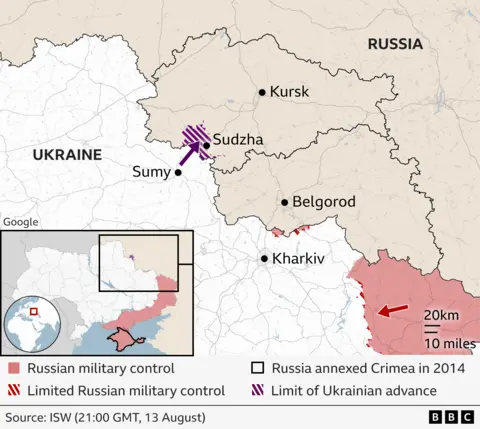
During his two and a half decades in power, Mr Putin has cultivated the image of “Mr Security”.“The only man in this vast country capable of keeping the Russian people safe and secure.
His so-called “special military operation” (full-scale invasion of Ukraine) was presented to the Russian people as a way to strengthen Russia’s national security.
It has been two and a half years since the war broke out but there are still few signs of “safety and security”.
There are more NATO forces on Russia’s border, as Sweden and Finland have joined the NATO alliance; Russian towns are regularly attacked by Ukrainian drones; currently, Ukrainian soldiers are occupying Russian territory.
Through his choice of language, Vladimir Putin is trying to show the Russian people that there is no need to panic.
When referring to the invasion of Ukraine, he avoided using the word “invasion”. Instead, he spoke of “the situation in the border area” or “the ongoing events”. The Kremlin leader also called the Ukrainian attack “a provocation”.
What will the Russian president do next?
Don’t expect him to pick up the phone and call Kyiv. Russian officials have made it clear that, after Ukraine’s attack, they are putting the idea of peace talks on hold.
Not that any large-scale negotiations are scheduled to take place.
In fact, this week leader Vladimir Putin stated his exact intention: “…to force the enemy to leave Russian territory.”
Saying is one thing, doing is another. Despite deploying reinforcements to the Kursk region, the Russian army has yet to regain control of this part of Russia.
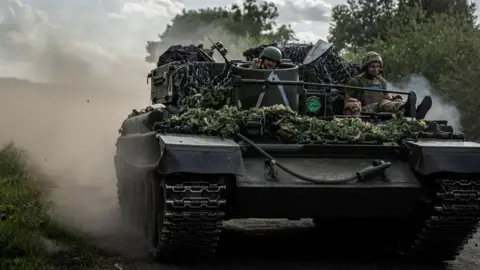 Reuters
ReutersAs I passed the Kremlin on Thursday morning, I stopped.
As workers set up seating and screens for an event, Edith Piaf’s classic song No, I don’t regret it. (No, I don’t regret anything) was played on a large video screen and echoed throughout Red Square.
It was a very surreal moment.
Vladimir Putin shows no remorse for launching a full-scale invasion of Ukraine.
No regrets about the decisions made since then.
If his public statements reflect his current mental state, he still believes there is only one possible outcome in this war: Russian victory.





